Final Report for LNC14-356
Project Information
The Bison Advantage Outreach and Education Program concluded on September 30th and is being considered a huge success by the National Bison Association (NBA) and its project partners. We were able to directly reach 174 extension agents, ag educators and existing and potential farmers and ranchers through our workshop series. The NBA was able to reach an additional 200 extension agents through exhibition at the September Extension Agent Trade Show. Further dissemination of program materials and learning resources reached an additional 323 bison farmers and ranchers across the North Central region, in every state. While we aimed to directly reach 1,000 individuals in this program, we managed to directly reach 697, however, we also came in $22,617 below our projected program budget.
The project also resulted in great new learning tools that promote a sustainable and holistic approach to bison production. The2nd edition of the Bison Producer’s Handbook, a comprehensive book that is packed with information for veteran bison producers and newcomers alike, was published and disseminated in January reached 836 National Bison Association members in addition to those who attended our workshops. More than 30 industry experts collaborated to develop nearly 300 pages of useful, readable information on all aspects of bison marketing and production. We even got an endorsement from famed humane animal handling specialist, Dr. Temple Grandin – “An essential source of information for people getting started in the bison industry. It is also a valuable reference for established bison producers.” The book also includes a chapter on holistic bison pasture management, by project team member and certified Holistic Management Education instructor, Roland Kroos.
Accompanying this great learning tool is the bison learning curriculum and the corresponding online training, which we’re calling Bison 301 to compliment our other two preexisting online trainings, Bison 101 and Bison 201. Bison 301 is based on the learning curriculum that the project team developed, designed to introduce extension agents, as well as new and existing livestock producers, to a holistic and sustainable approach to bison ranching. The online training covers everything from the history of the animal and the industry to holistic bison management, and includes case studies of six sustainable bison start-ups from across the country that details their stories on how they got started in the bison business.
This toolkit of learning resources has provided the adequate training needed to inform and educate stakeholders about this emerging business opportunity in the North Central United States. The tools will continue to be utilized across North America and beyond as more farmers and ranchers explore the bison business. These tools are ensuring that as we grow our business, we are doing so in a holistic and sustainable manner, which leads to longevity of our business and the species.
Introduction:
The Bison Advantage Outreach and Education Program was a tremendous success and largely met its proposed goals and objectives. The final months of the project saw a flurry of activity and outreach. We were able to facilitate six workshops, five of which took place on working bison operations and one which was facilitated at the National Buffalo Museum - which does include a small herd of bison. In addition to these workshops, the National Bison Association presented the project and its deliverables at six bison association conferences, resulting in a total 12 workshops/presentations.
Attendees were essentially split in half between extension agents/ agricultural educators, and new/prospective bison producers largely with no background in bison. Based on the workshop evaluations conducted after each workshop, attendees indicated that the learning tool-kit that they took home with them was very valuable in extending their own education on bison as well as to teach others about this emerging sector of American agriculture. The students also indicated that the workshops were very informative and well facilitated.
The learning tools developed through this project proved very adequate in educating individuals about raising bison in a holistic manner, and will serve the National Bison Association in educating many more in the years to come utilizing these resources. The Bison Producer's Handbook, for example, was distributed to the entire membership of the National Bison Association in the United States.
The project did fall short of its proposed 15 workshops by three. One proposed workshop, in conjunction with the Michigan Bison Association, was canceled because the associated event that was to host the workshop was unexpectedly canceled at the last moment and we were unable to find a suitable host in time. Another workshop, which was to be facilitated in conjunction with the Inter-Tribal Buffalo Council (ITBC), did not materialize due to scheduling conflicts. Unfortunately, the ITBC had prior commitments that did not permit the time, nor staff, to support a workshop. The last proposed workshop that did not come together would have occurred in Wisconsin in conjunction with the Wisconsin Bison Producers Association. This association did not follow through with a planned summer get together, which would have provided the workshop event space, due to their membership's lack of time during the busy summer farming months.
With these unexpected cancellations, the National Bison Association was able to adjust its work plan accordingly and hosted a booth at the National Extension Association of Family and Consumer Sciences (NEAFCS), which educates and recognizes Extension professionals who improve the quality of life for individuals, families and communities, annual tradeshow in Montana. This resulted in approximately 200 individuals, largely extension agents, to visit our booth and learn more about the Bison Advantage.
As such, the National Bison Association deems this project a tremendous success.
Overall, the project's objectives and performance targets were met in an efficient and productive manner. The project's originally proposed objectives and performance targets were outlined as follows, which is followed by the project team's assessment of each:
- The project’s first objective is to create a bison-specific curriculum that agricultural educators, particularly extension agents, can utilize to educate the next generation of producers.
The bison curriculum was developed by the project team successfully and was disseminated to all workshop attendees, including extension agents. The curriculum was further improved with an accompanying online training that serves as an abridged version of the 300-page Bison Producer's Handbook - 2nd edition and accompanies the eight-module training. The curriculum includes the project's newly developed holistic grazing guidelines for bison and every other major aspect involved in the production, management and marketing of bison. The curriculum was designed to allow flexibility to the educator by developing modules that focus on various aspects of the bison industry, such as holistic grazing, large and small scale operations, low-stress animal handling, etc. The National Bison Association has already started to further disseminate the curriculum and associated learning tools by sharing at the 2016 National FFA Convention, which draws over 55,000 young farmers and FFA advisors/educators. The curriculum will prove to be a great bison-learning resource for years to come. See the curriculum here: bison-advantage-curriculum-6-10-16
- The second objective is to support bison-specific research on pasture management protocols with partner ranches.
The research resulting from this project has proven very helpful and effective. Consulting with Roland Kroos - Crossroads Ranch Consulting, and Kirk Gadzia - Resource Management Services, both of whom are certified holistic management educators, the project team was able to develop the proposed holistic pasture management guidelines. These guidelines are included in the curriculum and featured in both the online training and the Bison Producer's Handbook - 2nd edition. The holistic pasture management protocols feature a twelve-step program that allows users to take incremental approach to developing a holistic agricultural operation, thereby allowing existing producers to move towards a holistically managed operation as well. The guidelines also include detailed information on the bison's relationship and impact on the land, rangeland and pasture ecology management, as well as the principles of holistic management. The protocols are especially useful as they can be applied to the small, ten head operation, or to those with the carrying capacity to host thousands of bison. Virtually all of the ranches that hosted workshops were already practicing holistic management, which resulted in an amazing classroom experience to show the results of holistic management live after educating in a classroom (or barn in our case...) environment.
- The third objective will be to develop a Best Practices manual for producers to utilize in the production of their animals.
This objective was met in the form of our learning tools. The great opportunity we saw in this project was the ability to develop a handbook for our industry that very much focuses on a sustainable and holistic approach to bison production. The Bison Producer's Handbook - 2nd edition stands as the go-to resource for both beginning and existing bison producers in educating themselves. As such, this project gave us the great opportunity to really direct bison farmers and ranchers in a sustainable and holistic direction. Again, this resource has already been disseminated to over 1,100 individuals including extension agents/educators, existing bison producers and potential farmers and ranchers. The 300-page book was written by 30 authors, all of whom are bison industry veterans, and includes the holistic pasture management protocols outlined in the proposal. Further, an abridged version of the book is available in our Bison 301 online training and which accompanies the project's bison-curriculum.
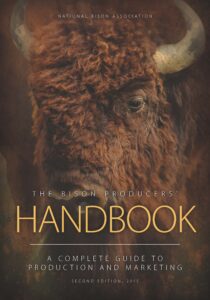
Cooperators
Research
In terms of materials and methods involved in this project, the project's deliverables, as described, exceeded our expectations. The methods chosen in this program thus proved effective and were followed closely throughout the 2-year program.
As described in our proposal, the National Bison Association relied on collaboration from a diverse group of stakeholders that made up the project team. The team assisted in providing outreach via workshops, trainings and field days across the North Central region utilizing the bison-specific, best-practices curriculum to educate both existing and potential bison producers on holistic bison management, as well as extension agents and agricultural educators.
As planned, the first two quarters of the project were spent developing the bison-curriculum with the project team. The group developed a well rounded curriculum that focuses on holistic management of bison. The team also worked with Roland Kroos during this time to develop the bison-specific, holistic pasture management protocols included in the learning curriculum and the best practices manual. The project team also held periodic conference calls to ensure the team's schedule was being adhered to and progress reported. The curriculum was extensively reviewed by other National Bison Association staff members, the project team and Dr. Vern Anderson from North Dakota State University’s Carrington Research Extension, all of whom agreed the curriculum achieved its stated mission.
The third and fourth quarters of the project period were dedicated to developing the learning tools outlined in the project proposal. The team decided that the best approach to developing the Bison Producer's Handbook, which served as our Best Practices Manual, was to seek industry experts to write the respective chapters that derived from the learning curriculum. The result is a nearly 300 page, comprehensive best practices guide that includes chapters by 30 authors, including the contracted holistic expert, Roland Kroos. Roland's chapter on holistic grazing management also serves as the grazing guidelines outlined in the project proposal. Upon completion, the National Bison Association focused on developing the online training that was to accompany the curriculum. In doing so, the team was able to provide Texas Tech University undergrad Alexandria White an internship in working on the Bison Advantage Outreach and Education Program. Ms. White took on the development of the online training, as well as assisting with the editing of the handbook. The outcome is a great supplement to the learning curriculum that will assist educators in teaching holistic bison management to interested parties for years to come. The NBA also worked on promoting the project during this time by attending four bison-related events including a holistic management workshop at a working bison ranch in Wisconsin, to promote the project and forthcoming workshops. Other presentations were made at regional bison association auctions and conferences.
The remainder of the project period was focused on project outreach. This time period saw the launch of our workshop series.
Workshops
- The first of which was held at Hanna Buffalo Ranch in Baldwin City, KS on June 11, 2016. The workshop was facilitated by NBA executive director Dave Carter and members of project partner, the Kansas Buffalo Association and had 20 registered attendees. The workshop also included a tour of the holistically managed Hanna Buffalo Ranch.
- The next workshop was held on June 17th at the 777 Ranch in Rapid City, SD and was facilitated by NBA Assistant Director, Jim Matheson. This workshop had a good mix of extension agents and private producers, including some neighboring bison ranchers who contributed greatly to the discussion, as did the host - the ranch manager. This workshop had 18 registered attendees. This workshop included a tour of the holistically managed ranch, including a tour of the ranches working facilities. The 777 Ranch has been holistically managed for over 15 years and proved to be a great classroom to show the real impacts of the practice. The ranch tour included the ranches extensive rotational grazing program as well.
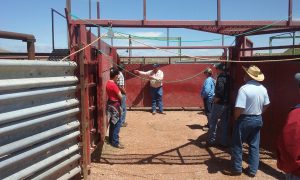
- On June 21, 2016, the NBA facilitated a workshop at the association's annual summer conference, which took place in part at Snake River Farm in Becker, MN. This workshop was facilitated by both Mr. Carter and Mr. Matheson, and saw heavy farmer/rancher participation with the many NBA members attending the conference's farm day. The workshop itself had 23 registered attendees including three local NCSARE staffers, which was a great addition to the classroom. The holistically managed Snake River Farm was another great classroom that included tours of the pasture and bison herd, among other features at this multi-species farm. The NCSARE staffers enjoyed the workshop and the great producer involvement that helped make the day such a success.
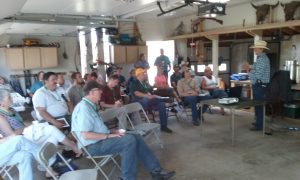
- On August 5th, Jim Matheson facilitated a workshop at the National Buffalo Museum in Jamestown, ND. The workshop had a full room of 20 attendees, with half being extension agents and the other half prospective producers, including one of the reviewers of the project proposal. As with all workshops, attendees were sent home with the bison toolkit, which not only included the Bison Producer's Handbook - 2nd edition and the learning curriculum, but also the NBA's Insider's Guide to Bison Management and Marketing educational DVD, and other pertinent literature. The North Dakota workshop coincided with project partner, North Dakota Buffalo Association's 25th anniversary weekend, also held in Jamestown, and featured a multiple ranch tour that weekend, which attendees were encouraged to attend.
- September 7, 2016 saw the workshop move to Urbana, Illinois which had a great attendance of 37 registered students. Dave Carter facilitated this workshop with local bison rancher, David Ruhter as a co-facilitator. The two held their classroom presentation and then traveled to Mr. Ruhter's Ruhter Bison Ranch, a holistically managed bison ranch outside of Urbana, for a ranch tour and Q&A session.
- The last workshop was facilitated by Jim Matheson and held at Cook's Bison Ranch in Wolcottville, IN on September 16, 2016 and had another great turnout with 56 registered attendees. This workshop's attendance was boosted thanks to nearby Purdue University heavily promoting the event, along with ranch owner, Peter Cook. The workshop also enjoyed volunteer assistance from Purdue extension, with whom the ranch works closely. The workshop was a great success and concluded with a tour of the holistically managed ranch. This particular workshop has seen a lot of follow up with attendees eager to learn more about sustainable bison production.
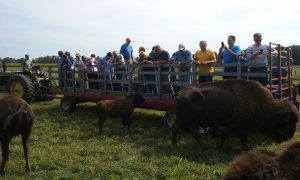
The final weeks of the project was focused on workshop evaluation, which was completed after each workshop through an online survey tool. Responses averaged about 33%, which the team was pleased with, and indicated that the workshops were very well run and informational.
Results and Discussion/Milestones:
The aforementioned surveys indicated that the project team delivered on its stated goals and objectives. While attendance was slightly lower than anticipated when the NBA wrote it's proposal, the project team was still very happy with the results. What the team learned is that summer is an extremely busy time for farmers and ranchers, and while we tried our best to accommodate these schedules, the numbers were lower than we had projected.
Again, to review our attendance:
- Total workshop attendees: 174
- Estimated Extension Agents reached: 287
- Estimated Farmers/Ranchers reached: 335
- Total Bison Toolkits disseminated: 497
- Total Best Practices Guides disseminated: 1,333
- Total project outreach: 1,955
Below are some quotes from workshop attendees, which serve as indicators of success, along with the respective workshop survey results:
- Hanna Buffalo Ranch: "I think the way you're doing it featuring different types of operations, gives people options best suited for the type of operation they may be contemplating, is ideal."
hannasaresurveyresults - 777 Ranch: "I received the Bison Producers Handbook which is loaded with helpful information"
777saresurveyresults - Snake River Farm: " I thought it was great! I wouldn't change a thing! The variety of people with their variety of expertise made the workshop extremely interesting and all the more valuable." And "Just wanted to say thank you for organizing this workshop. My wife and I were very glad we took the day off and made the drive to attend. We learned a lot. The materials are very comprehensive and useful. Having The workshop on a working ranch adds to overall experience. "
snakeriverfarmsareresults - National Buffalo Museum: " And as a program manager for Beginning Farmers and Ranchers Program, I can see how this workshop will benefit my own students!"
ndbasaresurveyresults - Cook's Bison Ranch: "Jim Matheson provided a thorough overview, answered questions completely and was adept at leveraging the hosts and others in the audience with insight into the commercial Bison business."
cbrsaresurveyresults
Below you will find an assessment of our proposed learning and action outcomes. Overall, the project team was pleased with the results of the project, but also see a need for continued education on the subject and extensive follow-up with the project participants.
Learning outcomes will include:
• New and existing producers, and agricultural educators, will gain new, valuable knowledge about raising bison as livestock in today’s farm economy. Current bison producers will gain new knowledge about proper grazing practices for bison, as well as range management practices that will sustain pastures and support bison.
The project team believes the project achieved the above outcomes. Both new and existing producers were among the workshop attendees, and nearly 900 National Bison Association members received the Bison Producer's Handbook, which includes the chapter on the grazing environment for bison that features the holistic grazing protocols developed through the project.
- Producers’ awareness about bison production as a viable agriculture endeavor will be raised, with a focus on Native Americans. Awareness will also be raised among existing bison producers about proper grazing practices that will benefit both their herds and the land.
Given the number of prospective producers attending the workshops, this outcome was successfully met. Further, through educating extension agents about bison production, the project will continue to raise awareness among producers across the North Central region. Unfortunately, due to the cancellation of the Inter-Tribal Buffalo Council workshop, the project did fall short in its outreach to Native Americans. However, there were tribal members at three of the workshops, including a tribe that traveled from Oklahoma to South Dakota for the 777 Ranch workshop. Existing producers were successfully reached through the workshops and dissemination of the best practices manual.
• As a result of this project, agricultural educators, with a focus on extension agents, will gain knowledge about this emerging sector of American agriculture, and thus, be better to assist new farmers and ranchers.
Again, given the number of extension agents reached through the workshops, the project team believes that those agents that participated will be better able to assist potential bison farmers and ranchers.
- The project will change attitudes about raising bison as livestock as a profitable ranching endeavor in the North Central region among agricultural educators from vocational teachers to university professors to extension agents.
The project team believes it's too soon to tell if attitudes about bison as a livestock sector have changed. However, the industry has been enjoying a surge of attention thanks in part to this project, as free workshops of any type are still a relatively rare occurrence, we believe attendance was bolstered. Furthermore, the designation of the bison as the first-ever US National Mammal and low cattle prices have all resulted in attitudes changing towards bison.
Action outcomes will include:
• The holistic management education and outreach offered in this proposal will change the behavior and actions of existing bison producers across the North Central region. Holistic management is a significant focus for the project. Certified holistic management educators will be utilized in outreach, to expand the ability of producers to ranch for profitability while improving their lands simultaneously.
Thanks to the bison industry's primary learning tool being the SARE funded Bison Producer's Handbook, which incidentally gained the endorsement from famed humane animal handling specialist, Dr. Temple Grandin, this project has already resulted in changed behavior and actions by producers. The NBA is receiving more inquiries about rotational grazing, and other holistic management inquires. Two holistic management educators were employed through this project to provide outreach and consulting. The overarching theme of the handbook, and the grazing guidelines developed, is ranching for profitability while improving the landscape, as outlined in the proposal.
- The project will result in an increase in educators teaching farmers and ranchers how to raise bison. Targeted educators will include vocational teachers, university professors, tribal leaders, extension agents, FFA/4H advisors, etc.
As a long-term goal, it is too early to ascertain how many participants have incorporated the curriculum into their learning lessons. The team expects this to grow as students request more information as bison becomes a more consistent topic in agriculture. Further, the project's learning curriculum was heavily distributed at the 2016 national FFA convention with the advisor packets that were distributed at the National Bison Association's booth where interest had grown significantly over the past year thanks to the aforementioned National Mammal designation, strong economic growth and overall great publicity.
• Through education and outreach, the 15 proposed workshops, the pasture and rangeland management guidelines, and the online tutorials, will enable more farmers and ranchers to raise bison in the region utilizing a holistic approach.
While the project did not meet its 15 workshop, it did participate in a total of 12 events to raise awareness and educate farmers and ranchers, as well as extension agents, about holistic bison management. Again, as a long-term goal, it's too early to tell but as with education and outreach, we expect this type of management to grow along with consumers that increasingly demand it.
• Through the development of a Best Practices manual, the National Bison Association will expand its ability to disseminate to producers the information and knowledge gained through this project.
As mentioned, with nearly 2,000 of the Bison Producer's Handbook - 2nd edition distributed through this project, and 3,000 still in inventory, the NBA has the ability to continue to disseminate the information garnered through this program for years to come.
Economic Analysis
Farmer Adoption
The National Bison Association foresees bison producers to continue to adopt a more holistic management style in their production models, as consumers from a considerable portion of the bison meat market have come to expect such a management style for this high-dollar product. Due to increased consumer demand and a low supply of market-ready bison, the price per pound is at an all time high of $4.73/lb. (HHW) currently. The bison business achieved unparalleled strength, stability and profitability in 2016. Sales of bison meat in restaurants and retail stores now tops $340 million a year. Prices that ranchers are receiving from processors and marketers have been pegged at all-time highs for the past six years. As such, bison meat has become a delicacy in the United States and beyond, and the industry is under the watchful eye of consumers who spend significant amounts of money on naturally raised bison meat.
Furthermore, the extension agents that participated in this project all reported an increase in bison inquires from their clients, hence their attendance. The National Bison Association expects this trend to grow, as more and more established cattle producers are taking a good hard look at the bison business, as comparable cattle carcass prices are currently at $1.62/lb. (HHW), compared with bison's $4.73/lb., both according to USDA's Agriculture Marketing Service.
The resources and learning tools developed through this grant will allow us to continue to educate and encourage bison farmers and ranchers to raise their animals in a holistic manner, as we preach in our learning toolkit. The NBA has also been approached by multiple extension agents, and tribal organizations to facilitate similar workshops for their clientele as the word spread about our workshop series through the bison community amid rave reviews.
For these reasons, the project team deems farmer adoption of the project's message a success.
Educational & Outreach Activities
Participation Summary:
The Bison Advantage Outreach and Education Program relied mostly on press releases, social media and websites to promote the workshop series. Flyers were also printed to promote the workshops as well and disseminated in print and electronic formats. The project team was pleased with the overall turnout for the workshops, given the busy summer season for producers and extension alike. See sample flyers and press releases, below:
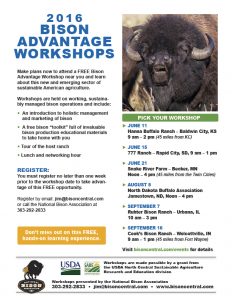
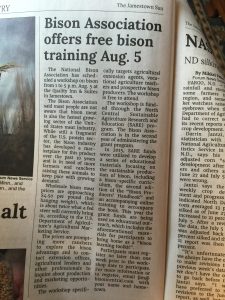
Project Outcomes
Areas needing additional study
Areas Needing Additional Study:
The Bison Advantage Outreach and Education Program provided invaluable research and resources to the National Bison Association, its project partners and the bison industry as a whole. The NBA now has a thorough toolkit to continue to disseminate to new and current producers in an effort to guide our burgeoning industry in a holistic and sustainable direction. With the launch of the NBA's new website at the end of this year, in which the information garnered from this project will be included and further distributed to many more to provide a consistent message from the NBA regarding holistic management of bison as the industry norm.
As helpful as this project has been to the bison industry, and to sustainable agriculture, we are still very much in need of more research and education outreach. As well as the current market is, the bison industry remains a very small and fragile segment of the U.S. livestock sector. Slightly more than 60,000 bison were harvested in the U.S. in 2015, versus 125,000 cattle slaughtered daily on average. Further, the industry does not have a mandated check-off program like other commodities that bring in millions in research funding annually. The NBA does have a voluntary check-off fund that raised about $50,000 in 2015 and is largely dedicated to product promotion, which makes grants like this so valuable to the bison industry. As such, the National Bison Association will continue to seek funding from SARE and other funders to support a variety of research issues facing our industry affecting herd health, cost-effective marketing, herd management, risk-management and a variety of other areas.
The National Bison Association would like to take this opportunity to sincerely thank NCSARE for this opportunity. The staff at the University of Minnesota have been a pleasure to work with and have been incredibly responsive to all of our needs throughout the project period. The fact that three staffers made the trip to attend, and actively participate, in one of our workshops speaks volumes. The NBA enjoyed working with everyone on the team and hopes to again.